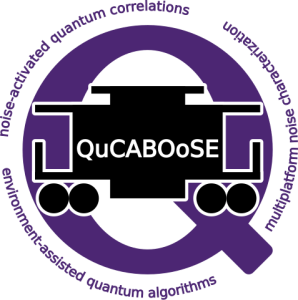QuCABOoSE

Quantum Coherence Activation By Open Systems and Environments
The QuCABOoSE project challenges the belief that interactions with an environment necessarily diminish quantum effects forever and, thereby, restrict the progress in the fields of quantum science and technology. The main goal of the project is to establish open systems as systems that are, in fact, supplemented by a quantum environment, rather than being impaired through the environment, shining a new light on an untapped resource for quantum applications and their physical implementations. By considering the full quantum nature of interaction between systems and environments, we target three main objectives: noise-activated quantum correlations, environment-assisted quantum algorithms, and multiplatform noise characterization.
Thanks to the diverse composition of the consortium, we will address the research goals from a combined theoretical-experimental perspective, without limiting us to a specific physical system. On the one hand, quantum-noise control and system-bath quantum entanglement, for example, will function as a testbed to probe the fundamental advantages of a full system-environment quantum picture, allowing us to explore how previously lost quantum features can rebound through environment backactions.
On the other side of the spectrum, quantum protocols will be devised that, for example, (re-)activate quantum correlations due to the presence of and interaction with an environment. To name one application, a self-purifying quantum communication (teleportation), powered by a quantum environment, is proposed. By covering the range from fundamental to applied, the project’s findings advance our knowledge of open quantum systems as well as offer a fresh approach to quantum information science in realistic systems.
CONSORTIUM
- Coordinator: Katarzyna Roszak (Institute of Physics, Czech Academy of Sciences, CZ)
- Jan Sperling (Paderborn University, DE)
- Marc Aßmann (Technische Universität Dortmund, DE)
- Andrea Chiuri (National Agency for New Technologies, Energy and Sustainable Economic Development, IT)
- Jaroslaw Korbicz (Center for Theoretical Physics, Polish Academy of Sciences, PL)





